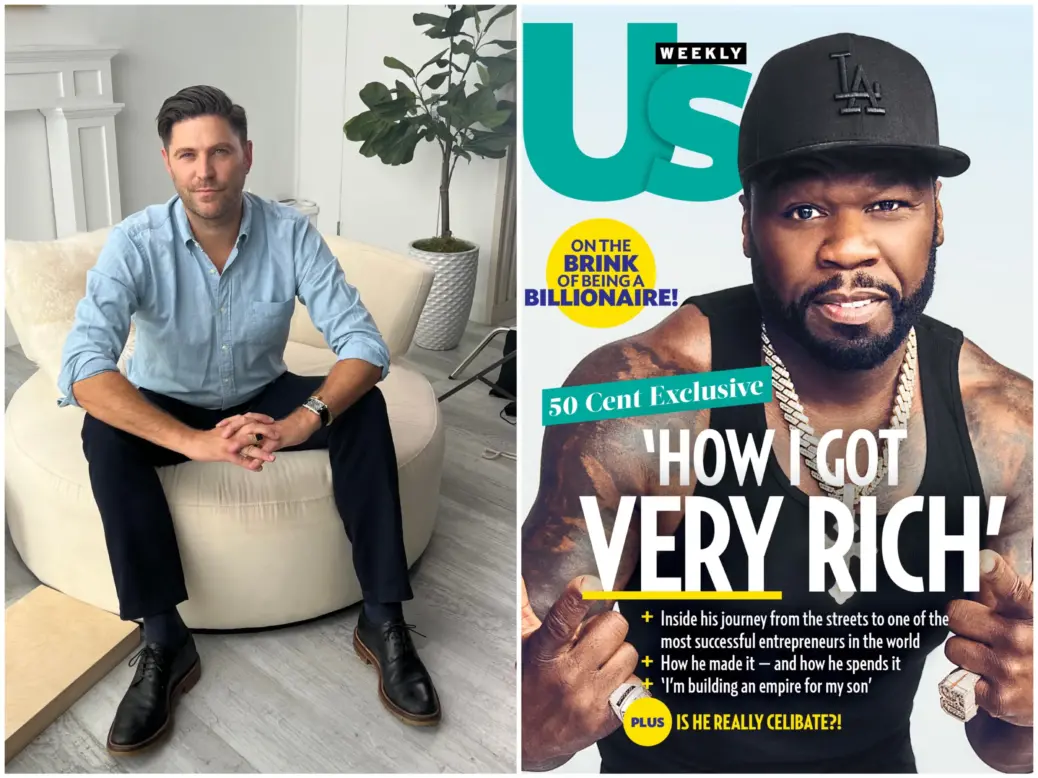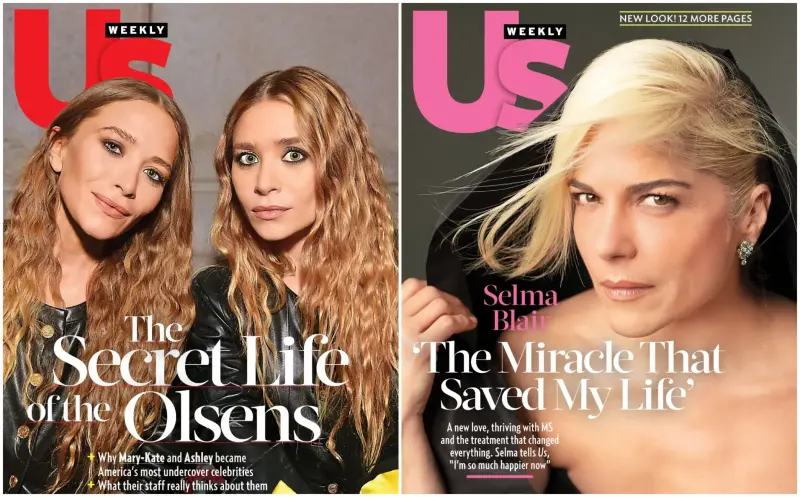
The editor of Us Weekly has described the speculation around the “disappearance” of Catherine, Princess of Wales from the public eye this year as a “seminal moment for celebrity and entertainment journalism”.
Dan Wakeford, who joined the magazine in March, said many journalists were “chastened” by Kate’s announcement that she was undergoing treatment for cancer after widespread media speculation about the reasons for her not appearing in public.
Wakeford was editor of People magazine, the most-read celebrity title in the US, for three years and then spent 2023 as editor-in-chief of digital news start-up The Messenger, which closed down in January after almost nine months of publication.
Under Wakeford’s tenure Us Weekly has already added an 12 extra pages to the weekly print edition and increased it from 48 to 52 issues per year, focused more on different types of celebrities including sports stars and influencers, added more original reporting, and created a new studio to film video content.
However he said he hasn’t changed the celebrity “DNA of the brand”, instead focusing the tone of its reporting to be “a little bit more intelligent… sharper, brighter, funnier” and making sure it is an antidote to the “hard” news cycle.
Us Weekly is part of magazine and specialist publishing group Accelerate360 (formerly American Media Inc).
Us Weekly editor to ‘improve authoritativeness’ of its celebrity journalism
Speaking to Press Gazette, Wakeford described a renewed focus on truth, accuracy and “being authoritative”.
He explained: “When I started, it was around the period just after the Kate Middleton coverage of her cancer and I think that was a seminal moment for celebrity and entertainment journalism.
“Everybody felt bad about the speculation, and were chastened by Kate sharing her reality in such a humble way.
“But even if it wasn’t the Kate story, AI and a country polarised by political discourse – if not the world polarised by political discourse – is spreading levels of mistrust in the information we’re giving them. So it’s a no-brainer for me to increase the authority and enhance our journalism at Us Weekly to focus on truth and quality.”
Asked what this means in practice, Wakeford said there will be more on-the-record interviews, for example with actress Selma Blair in the first of the “new look” issues in July where she spoke about dealing with multiple sclerosis.
He added that they are “trying to actually have that directly from her words. So when you have that, you have authority, and the readers realise that we are more trusted.”
“We’re making sure that we are fact-checking,” Wakeford continued. “We’re going to multiple sources on different stories and just improving our journalism, and I believe that will resonate with the audience.”
Wakeford said Us Weekly had done reader surveys and found it was “really trusted” already but added that there were “elements that I wanted to improve. I wanted to make it a little bit less, as a brand, scrapbooky and photo based.
“We still love the fun photos, but I wanted to enhance the access and I thought that there was a very good gap in the market here: that there was a gap between the elements of tabloids and internet gossip and what is untrue and what isn’t true, and then you have the business of Hollywood and the art of Hollywood.
“I see us fitting in very much in a middle area where it can provide the fun, but still be authoritative, and it’s a little bit cooler and smarter than a lot of our rivals.”
Wakeford, a Brit who first moved to the US in the early 2000s for senior positions at Bauer’s In Touch Weekly celebrity magazine, said he has a “deep relationship with Hollywood” which will help him encourage more interviewees. Other cover stars since the changes have included 50 Cent and celebrity chef Sandra Lee.
He said: “Hollywood’s really welcoming having a smarter, cooler, trusted place to share their stories.”

Asked how Us Weekly differs from his former celebrity magazine home People and other titles in the market, Wakeford said readers of his new title are in their “very early 40s” on average and described this as “a good decade younger” than at People.
This means, he said, “we can be smarter, we can be cooler, we can be fresher, we can talk the reader’s language. That is a big brand distinction.
“Us Weekly is 100% celebrity, 100% of the time. We don’t cover crime, we don’t cover human interest. We’re not doing the crazy stories on the internet about regular folks. We are focusing purely on entertainment and celebrity stories.”
Of the audience Wakeford wants to reach, he said: “We’re trying to bring smart, busy and curious women into the brand who want to escape the daily grind of life, and who currently feel guilty about consuming celebrity or entertainment news.
“I want to make people proud that they’re interested in celebrity news. The people we want to bring in are all aware that celebrity and entertainment – it’s not brain science. We’re not saving the world. They’re aware it’s a little bit trivial, but that’s the joy of it. And so we really want people to feel proud of their interest and we believe the celebrity stories can be good to you.”
‘There’s no reason why print won’t last forever’
Wakeford explained why he has expanded Us Weekly in print in a world of declining magazine circulations.
“I think generally with society, there’s an awareness that tech and social media are not always good for us and that we all need time to sit back and get off our screens,” he said.
“But we also need to make sure that experience is as fun and engaging as the online world with great storytelling and laugh out loud moments that reward the reader.”
To get people to put down their phones, he said, “you need to have a little bit more substance. So giving it more pages gives you the room and the space to tell stories that you can’t get on the internet, to provide an experience that you can’t get on the internet”.
He added that he feels “very optimistic” about the future of print in general: “I think people will always seek out that special experience, and as long as you are providing a compelling proposition that you can’t get in the digital world, print will exist. There is a renaissance in books. If you’re providing that experience, then there’s no reason why print won’t last forever.”
Digital-first Us Weekly becomes 24/7
Despite this, Wakeford said, US Weekly is still “a digital-first brand” and growing.
May was its “biggest digital month for the last 18 months where other people are floundering,” he said. According to Press Gazette’s monthly ranking, US Weekly was 37th biggest news/entertainment website in the US in May with 29.5 million visits according to Similarweb – growth of 48% year-on-year and 14% month-on-month.
Wakeford said Us Weekly’s digital audience is about 24 million unique visitors each month while the magazine has a print circulation of 1.95 million with an ultimate print readership of eight million people per week.
The brand is expanding to have 24/7 coverage with new hires in the UK and Australia, Wakeford revealed.
They are also doing more video, particularly on Us Weekly’s owned and operated platforms but also on Youtube where Wakeford said they have a “very robust business”.
He added that they will be exploring “where to leverage the brand into television and other syndicating opportunities as well with video”.
Wakeford said he has seen a “fantastic reaction from advertisers so far” to his changes.
The editor also discussed his time at the ill-fated The Messenger, describing it as a commercial failure rather than an editorial one.
“I’m very proud of the work we did at The Messenger and we brought together a really, really super strong team of great journalists… Obviously, it was a very difficult time at The Messenger but I learned an awful lot and so it was a positive experience overall.”
He added: “It’s a tough and challenging world and you’ve got to grow slowly, and the commercial proposition was very challenging.”
Email pged@pressgazette.co.uk to point out mistakes, provide story tips or send in a letter for publication on our "Letters Page" blog
